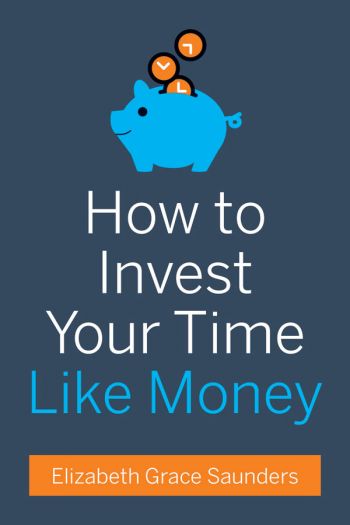24 hours—that’s all, folks
Book Review: A short, timely guide to regaining your life
- |
- Written by Will Taylor
- |
- Comments: DISQUS_COMMENTS
 How To Invest Your Time Like Money. By Elizabeth Grace Saunders. Harvard Business Review Press. 75 pp. (This is solely available as an ebook.)
How To Invest Your Time Like Money. By Elizabeth Grace Saunders. Harvard Business Review Press. 75 pp. (This is solely available as an ebook.)
As a trust officer, I am involved with investments. Most of the accounts for which I am responsible deal with various investments and my duties include the management of clients’ assets to gain the best return with the appropriate level of risk.
All that being said, my years of experience in investing money rarely considered the investment of time in the same vein as money.
Yet time is a valuable resource, has limits on its availability, and in many situations is in short supply.
That value, that scarcity, makes a short e-book How to Invest Your Time Like Money a thought-provoking read. Can we indeed consider the allotment of time as if it were an asset allocation?
Author Elizabeth Grace Saunders believes time can be treated as we work with money, to improve efficiency and decrease stress. Saunders is an expert on effective time investment.
In her five brief chapters, Saunders does not waste time in getting to the point to share her knowledge. She offers not only encouragement but also step-by-step methods to harness time.
Taking time to consider time
Chapter One, “Take Control of Your Time and Your Life,” is an excellent summary of the attitudes and resulting difficulties in today’s day-to-day world. A key point I found is: “Instead of becoming a victim chose to take ownership.”
Even if the method of time management and allotment which comes in the subsequent chapters is not followed, a change of attitude is a great start. It begins when we take responsibility for our actions.
Chapter one contains valuable charts which outline clearly how we should begin this process of time allotment. You could compare this to fixing the hole in our pocket through which all our money slips away.
Fully grasping the many points of taking control are important beginnings in this process. Just as we are slow to change our habits of spending money, so can be our hesitancy in views on time.
“Pinpoint the pain,” Saunders says, as well as, “Accept the past and forgive yourself.” More than improved time management can be gleaned from this encouragement.
Time investments like mutual fund picks
The remainder of Saunder’s short chapters provide the processes to work through things, as you allocate your time as one would a portfolio of mutual funds. Emphasis is given to the most important things, with a firm distribution of time assigned to important obligations. These allocations carry through all parts of the day and would include both personal and work-related items.
On the personal items, planning is recommended to stubbornly reserve time for those things that we want to do but never have time for, because of other items that tend to take over the day.
This clear and deliberate schedule of intervals is the heart of the matter, in my opinion.
To be able to firmly say no to work or people that are overtaking one’s time at the cost of personal time and those things that we never seem to have the time for is where the real success is realized.
The method of allotting the time as outlined in these chapters is important as habits are changed—the old is tossed and new attitudes and new methods of planning adopted. Each chapter takes the reader further into the methodology in a logical process. Another important part of this is realization that we each need to take responsibility for our actions. Reading this e-book can be an excellent first step.
Save time for the kicker
As beneficial as the chapters are in taking control, do not miss “Epilogue: Remember What You’re Working For.”
The real-life awareness that Saunders experienced in outplacement classes after she was laid off should be an encouragement to take control of our time. She came to the realization from listening to laid-off workers who had a long history with their previous employers of “the importance of remembering who really loves you. Unless you work in a family business, the people you work with don’t love you. Yes, they may care about you. But, in the end, their primary interest is in getting a certain job done. They’ll be sad to see you go if you move on, but soon another person will take your place. The people who do really love you—your family and your friends—can provide an enormous amount of enduring joy and support, if you invest in those relationships as part of what’s most important.”
This booklet is worth your time investment. The return on your investment may be of substantial value. Indeed, you may earn dividends for life.
Tagged under Human Resources, Management, Duties, Blogs, Books for Bankers, Feature, Feature3,














